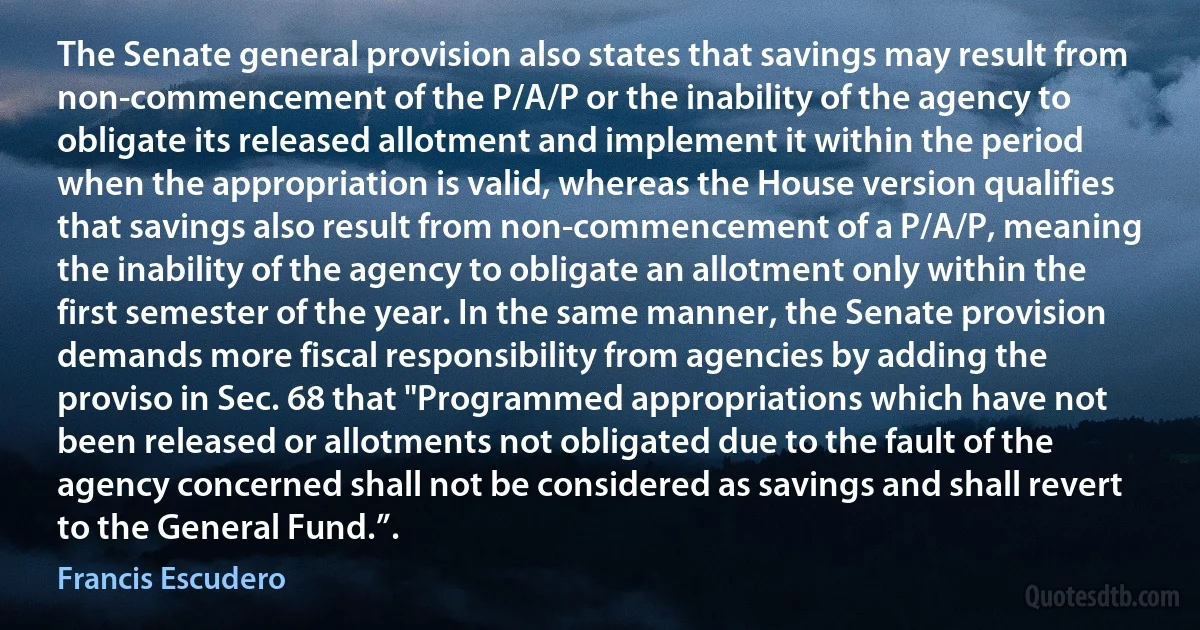Inability Quotes - page 12
There are people who, when they encounter inability to understand, do not ask the Lord. But one must immediately say, "Lord, I am a sinful man and I don't understand as I should. But give me understanding, merciful One, as to how I must proceed." And the merciful Lord then inspires them as to what to do and what not to do.

Silouan the Athonite
The nastiness was infectious. McCain himself started asking, "Who is the real Barack Obama?" and his crowds sometimes turned scary. But the rest of the public wanted to know more about its economic future, not Obama's past. When McCain finally came up with a plan for the economy, the vision thing was still overwhelmed by his inability to hide a genuine disdain for Obama. At every debate, the edge in his voice and grimace on his face were unmistakable. If this indignant McCain had a bubble over his head, it would no doubt say, "Can you believe I'm in the ring with this unqualified guy and he's beating me?" Yes, we can.

John McCain
As the title of his 1941 book indicates, the theory of capital lay at the heart of his theory of the cycle. The reason is that he attributes the cycle not to changes in aggregate demand, or even to changes in the quantity of capital, but to changes in the structure of production and hence the structure of the capital stock. In this, his theory was highly unusual: one of the reasons for his failure to engage more effectively with Keynes was the latter's inability to see how the theory of capital could be of any importance for the cycle. Because the theory of capital is so central, and because it is so complex, it needs to be explained carefully. After that, the rest of his theory falls into place comparatively easily.

Friedrich Hayek
I fear, in fact I am rather certain, that due to my inability to express myself with the power and penetration of the great Churchill, I have not made clear the points that assume such prominence and importance in my mind. However, I have done my best, and I hope I have sown some seeds which may bring forth good fruit.

George C. Marshall
She's such a bitch,” Tina says, which I find a little contradictory, but overall quite true. "She's got to be in charge of everything.”
I sit next to her. "Well, I guess. But in business, that's leadership.”
Tina stares at me for a second. "I can't believe you consider that a positive trait. How about her inability to accept other points of view? Is it good leadership to be narrow, too?”
"Focus,” I say. "They call that focus.”
Tina stares at me. "Her paranoia?”
"Business savvy.”
"Compulsive need to have everything just how she wants it?”
"Organizational skills.”
"Aggressiveness?”
"Aggressiveness,” I say, "is already a good thing.”
"Jesus Christ,” Tina says, her eyebrow ring glinting in the morning sun. "Sometimes I worry about this country.

Max Barry
When I was young I longed to write a great novel that should win me fame. Now that I am getting old my first book is written to amuse children. For aside from my evident inability to do anything "great," I have learned to regard fame as a will-o-the-wisp which, when caught, is not worth the possession; but to please a child is a sweet and lovely thing that warms one's heart and brings its own reward.

L. Frank Baum
[T]he labourers have a right to subsistence out of the land, in all cases of inability to labour; that all those who are able to labour have a right to subsistence out of the land, in exchange for their labour; and that, if the holders of the land will not give them subsistence, in exchange for their labour, they have a right to the land itself.

William Cobbett
Now that copyrights can be just about a century long, the inability to know what is protected and what is not protected becomes a huge and obvious burden on the creative process. If the only way a library can offer an Internet exhibit about the New Deal is to hire a lawyer to clear the rights to every image and sound, then the copyright system is burdening creativity in a way that has never been seen before because there are no formalities.

Lawrence Lessig
I bow before the authority of special men because it is imposed upon me by my own reason. I am conscious of my inability to grasp, in all its details and positive developments, any very large portion of human knowledge. The greatest intelligence would not be equal to a comprehension of the whole. Thence results, for science as well as for industry, the necessity of the division and association of labor. I receive and I give - such is human life. Each directs and is directed in his turn. Therefore there is no fixed and constant authority, but a continual exchange of mutual, temporary, and, above all, voluntary authority and subordination.

Mikhail Bakunin
In 1879, American economist Francis Walker tried to explain why members of his profession were in such "bad odor amongst real people". He blamed it on their inability to understand why human behavior fails to comply with economic theory. We do not always act the way economists think we should, mainly because we're both less selfish and less rational than economists think we are. Economists are being indoctrinated into a cardboard version of human nature, which they hold true to such a degree that their own behavior has begun to resemble it. Psychological tests have shown that economics majors are more egoistic than the average college student. Exposure in class after class to the capitalist self-interest model apparently kills off whatever prosocial tendencies these students have to begin with. They give up trusting others, and conversely others give up trusting them. Hence the bad odor.

Frans de Waal
If Stalin engineered the Prague coup without fully anticipating these consequences, it was not just because he had always planned to enforce his writ in a certain way throughout the bloc. Nor was it because Czechoslovakia mattered much in the grand scheme of things. What happened in Prague-and what was happening at the same time in Germany, where Soviet policy was moving swiftly from stonewalling and disagreement to open confrontation with her former allies-was a return by Stalin to the style and strategy of an earlier era. This shift was driven in general terms by Stalin's anxiety at his inability to shape European and German affairs as he wished; but also and above all by his growing irritation with Yugoslavia.

Tony Judt
[Labour's] socialist argument recognised that the system of economic gambling, commercial whim, speculative profiteering and profligate waste of the earth's resources that is dignified by the title 'private enterprise' is increasingly demonstrating its inability to meet human needs for food, employment, security and fulfilment.

Neil Kinnock
Cyril Chantler, one of Britain's wisest doctors, likes to give people a photocopy of Enoch Powell's book on medicine and politics and tell them that it's the best thing ever written on the NHS. Younger readers may not have heard of Enoch Powell, but he was a Tory minister of health in the early 1960s. He is most famous for his racist "rivers of blood speech," and I can remember protesting outside his Belgravia home. Could he really have written the best book on the NHS? I think that Cyril is right. One of Powell's strengths is that he was a distinguished classicist and writes beautifully, with directness, clarity, and wit: it's like reading Tacitus on the NHS. Another strength is his inability to dissimulate; the source of his catastrophic speech, his weakness as a politician, and his most famous observation that "all political careers end in failure."

Enoch Powell
The Church of Reason, like all institutions of the System, is based not on individual strength but upon individual weakness. What's really demanded in the Church of Reason is not ability, but inability. Then you are considered teachable. A truly able person is always a threat. Phædrus sees that he has thrown away a chance to integrate himself into the organization by submitting to whatever Aristotelian thing he is supposed to submit to. But that kind of opportunity seems hardly worth the bowing and scraping and intellectual prostration necessary to maintain it. It is a low-quality form of life.

Robert M. Pirsig
This congeniality is another illusion. I loathe Gogol's moralistic slant, I am depressed and puzzled by his utter inability to describe young women, I deplore his obsession with religion. Verbal inventiveness is not really a bond between authors, it is merely a garland. He would have been appalled by my novels and denounced as vicious the innocent, and rather superficial, little sketch of his life that I produced twenty-five years ago. Much more successful, because based on longer and deeper research, was the life of Chernyshevski (in my novel The Gift), whose works I found risible, but whose fate moved me more strongly than did Gogol's. What Chernyshevski would have thought of it is another question-- but at least the plain truth of documents is on my side. That, and only that, is what I would ask of my biographer-- plain facts, no symbol-searching, no jumping at attractive but preposterous conclusions, no Marxist bunkum, no Freudian rot.

Vladimir Nabokov
Since it is always the same person whose mind thinks, wills, and judges, the autonomous nature of these activities has created great difficulties. Reason's inability to move the will, plus the fact that thinking can only "understand” what is past what neither remove it nor "rejuvenate it” ... have led to the various doctrines asserting the mind's impotence and the force of the irrational, in brief to Hume's famous dictum that "Reason is and ought only to be the slave of the passions,” that is, to a rather simple-minded reversal of the Platonic notion of reason's uncontested rulership in the household of the soul. What is so remarkable in all these theories and doctrines is their implicit monism, the claim that behind the obvious multiplicity of the world's appearances and, even more pertinently to our context, behind the obvious plurality of man's faculties and abilities, there must exist a oneness - the old hen pan, "the all is one” - either a single source or a single ruler.

Hannah Arendt
We should stop pretending that the US is a functioning democracy; Citizens United proves we are not-when the courts grant citizenship powers to corporations, money and greed become the nation's lifeblood, not the will of the people. The American people have allowed themselves to be dumbed down to the point that their opinions are easily manipulated by corporate-owned and controlled mainstream media. The inability to function as a viable component of government has resulted in the "people” fracturing into competing ideological and socio-economic fiefdoms. American democracy is little more than feudalistic plutocracy. It's an unsustainable model doomed to collapse in on itself.

Scott Ritter


![I came away from these Wallace [supporter] interviews with two basic feelings. First, that democracy in America (in any sense of the word) just might not make it. My mind flashed to scenes of Germany in the late 1920's. Confusion, rebellion, frustration, economic instability, a wounded national pride, ineffectual political leadership - and the desire for a strong man who would do something, who would bring order out of the chaos. Could it happen here? With the inability of the national leadership to solve the real problems facing this country, could the the blacks, long-hairs, "welfare chiselers", and political dissidents become the Jews and Communists of the Nazi experience? Could it happen here? I see no reason why it couldn't. (Bernie Sanders)](https://cdn.quotesdtb.com/img/quotes_images_webp/53/bernie-sanders-basic-came-1014253.webp)
